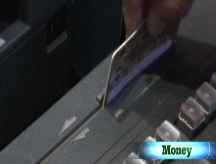Hidden credit card fees are costing you
New legislation may mean an end to interchange fees, which cost the average family more than $400 a year.
NEW YORK (CNNMoney.com) -- Swiping your credit card at the register may save you time, but it certainly won't save you money. Thanks to hidden fees, credit card purchases are costing you more than you may know.
Whether you use a card or not, you're probably paying more than $400 a year in "interchange fees," which are factored into the prices of everything from gas to groceries.
Every time a credit card or debit card is used to pay for a transaction, merchants pay a "merchant discount fee" to the bank for processing the payment. That covers the cost of renting the credit card terminal, customer service and an interchange fee, which all adds up to about 2% per transaction.
The interchange fee is by far the biggest chunk of the merchant discount fee. But it goes largely undetected by consumers because it's included in the advertised price of items and, merchants say, is too complicated to break out on individual receipts.
But credit card use has become so prevalent, it's costing retailers a fortune in fees. So merchants pass on this cost to consumers by way of higher prices, which means that even shoppers who don't use plastic end up paying more.
The average American family will pay $427 because of interchange fees in 2008, up from $378 in 2007, according to National Retail Federation estimates. The amount has nearly tripled from the $159 paid in 2001, the year NRF began tracking interchange fees. Collectively, that's $48 billion that the credit card companies will make from interchange fees this year, up from $42 billion last year and $16.6 billion in 2001.
So where does all that money go? Credit card issuers use this revenue stream to pay for the processing, in addition to reward programs, credit losses and general operating costs.
But many consumer advocacy groups believe it's time to put a stop to the bank fees that eat into retailers' profits, and push up prices paid by consumers.
"At a time when Americans are struggling to pay for groceries and to fill the gas tank, doing something about a hidden fee that drives up the cost of basic necessities should be one of Congress' top priorities," Steve Pfister, NRF senior vice president for government relations said in a statement.
Last week the House Judiciary Committee voted to move forward with the Credit Card Fair Fee Act of 2008, which requires lenders to negotiate with merchants and retailers on terms for fees paid when processing card transactions. The hope is that more flexibility to negotiate will bring interchange fees down, which will in turn allow merchants to keep their prices down. It also calls for the credit card companies and banks to be more transparent about their fee structures.
Most retailer and consumer groups support the change. As the legislation moves to the House floor, banking groups are voicing their opposition.
Edward Yingling, president and CEO of the American Banker's Association, said in a statement that the bill "interferes with the smoothly functioning electronic payment system that currently works to the benefit of consumers, businesses and the broader economy."
Not only would hindering the electronic payment system hurt businesses that benefit from faster transaction times and increased sales, the banking group said, but the legislation could also hurt consumers, by forcing credit card companies to raise their interest rates to cover costs.
Josh Floum, general counsel for Visa Inc., called the Credit Card Fair Fee Act "an anti-consumer bill that would mandate unnecessary regulatory intervention into a fiercely competitive industry that is benefiting consumers, merchants and financial institutions."
And if passed, the bill would give more power to the largest retailers and therefore "suppress competition and innovation and result in unintended and harmful consequences for consumers," Floum said.
MasterCard echoed the sentiment in a press release issued in response to the Judiciary Committee's approval. "It would be inappropriate for the U.S. government to set prices and negotiate the terms of contracts for private commercial entities."
But merchants aren't buying it. Mallory Duncan, chairman of the Merchant Payments Coalition, a retailing advocacy group, said the system as it stands hurts retailers more than it helps them.
And retailers aren't the only ones losing out, says Duncan. In tough economic times, consumers can't afford to cough up extra cash to credit card companies. "They've had a very sweet ride for 30 years," Duncan said.
Now lawmakers in Washington will duke it out. The issue pits those who say they are trying to alleviate the financial burden on consumers against those who are aiming to prohibit regulatory intervention and uphold the free market policy the credit card contracts are based on.
Congress is likely to vote on the Credit Card Fair Fee Act by the end of this year.
An earlier version of this story implied that Visa and MasterCard prevent merchants from diclosing interchange fees to customers. ![]()



